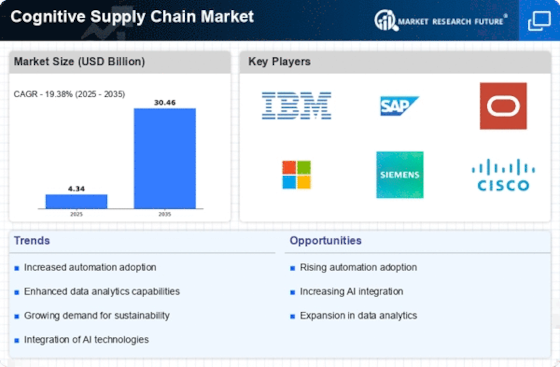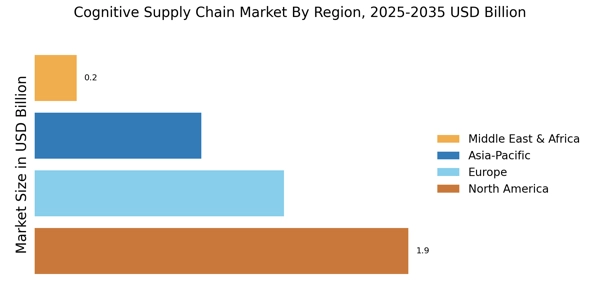Focus on Risk Management
The Cognitive Supply Chain Market is witnessing a heightened focus on risk management strategies. As supply chains become more complex, the potential for disruptions increases, necessitating robust risk assessment frameworks. Companies are investing in cognitive technologies that can identify vulnerabilities and predict potential risks. Data indicates that organizations with advanced risk management capabilities can reduce supply chain disruptions by approximately 25%. This emphasis on risk management not only enhances operational resilience but also fosters trust among stakeholders, thereby contributing to the overall growth of the Cognitive Supply Chain Market.
Sustainability Initiatives
Sustainability has emerged as a pivotal driver in the Cognitive Supply Chain Market. Companies are increasingly adopting sustainable practices to meet regulatory requirements and consumer expectations. This shift is leading to the integration of eco-friendly technologies and processes within supply chains. For example, organizations that implement sustainable sourcing and waste reduction strategies can enhance their brand reputation and customer loyalty. Recent market data suggests that businesses prioritizing sustainability in their supply chains can achieve a 15% increase in customer satisfaction. This trend underscores the importance of sustainability as a key component of competitive strategy in the Cognitive Supply Chain Market.
Collaboration and Partnership Models
The Cognitive Supply Chain Market is evolving towards collaborative and partnership models. Companies are recognizing the value of strategic alliances to enhance supply chain efficiency and innovation. Collaborative approaches enable organizations to share resources, knowledge, and technology, leading to improved performance. Data shows that companies engaged in partnerships can achieve a 20% increase in supply chain efficiency. This trend reflects a shift from traditional competitive practices to more cooperative strategies, which are essential for navigating the complexities of modern supply chains. As collaboration becomes more prevalent, it is likely to drive further growth in the Cognitive Supply Chain Market.
Demand for Real-Time Decision Making
In the Cognitive Supply Chain Market, there is an increasing demand for real-time decision-making capabilities. Companies are recognizing that timely information is essential for effective supply chain management. The ability to analyze data in real-time allows organizations to respond swiftly to market changes, thereby minimizing disruptions. Recent studies suggest that businesses leveraging real-time analytics can improve their supply chain responsiveness by up to 30%. This demand is driving investments in technologies that facilitate immediate data processing and analysis, further propelling the growth of the Cognitive Supply Chain Market.
Integration of Advanced Technologies
The Cognitive Supply Chain Market is experiencing a notable shift towards the integration of advanced technologies such as artificial intelligence, machine learning, and the Internet of Things. These technologies enhance operational efficiency by automating processes and providing real-time insights. For instance, AI-driven analytics can predict demand fluctuations, allowing companies to optimize inventory levels. According to recent data, organizations that have adopted these technologies report a 20% reduction in operational costs. This trend indicates a growing recognition of the need for agility and responsiveness in supply chains, which is crucial for maintaining competitive advantage in a rapidly changing market.

















